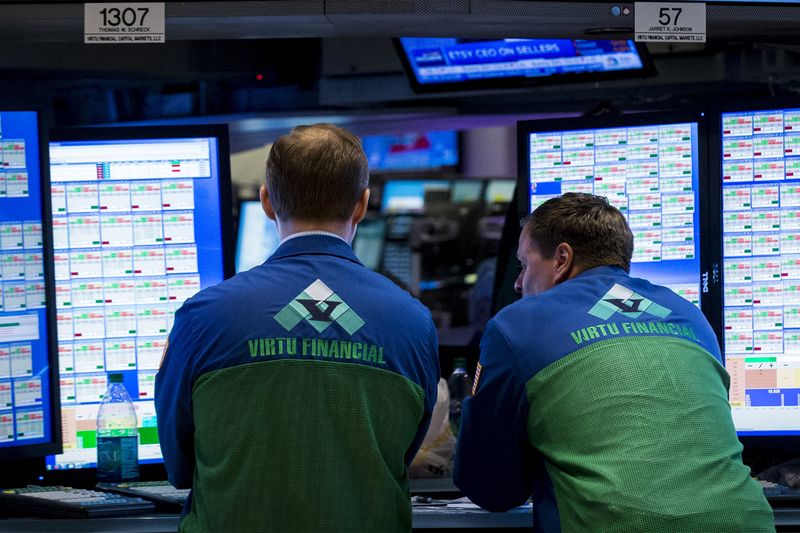
Investing.com — Initial jobless claims are set to ease further from their record highs, but remain at painful levels. Global stock markets have followed U.S. ones down overnight and Wall Street is set to open lower for a third straight day ahead of the jobless data release. Oil prices are rising again after the International Energy Agency trims its forecasts for demand destruction. And the Uber/GrubHub deal is still on. Here’s what you need to know in financial markets on Thursday, May 14th.
1. Global stocks follow U.S. down on second wave fears
Global stock markets tumbled, pulled lower by U.S. markets’ reaction on Wednesday to gloomy comments by Federal Reserve Chairman Jerome Powell on the outlook for the economy, and by signs of fresh outbreaks of the coronavirus in China and South Korea.
Europe’s benchmark Stoxx 600 fell 1.6% to a four-week low, with the U.K. FTSE 100 falling over 2% as the global concerns were compounded by fears of a looming trade shock when the post-Brexit transition period ends at the end of the year. Sterling also fell to a seven-week low against the dollar.
In Asia, meanwhile, Chinese stocks fell by around 1%, amid concerns that U.S.-China relations will be strained further by the pandemic fallout and the upcoming election campaign. President Donald Trump signed an executive order extending sanctions on Huawei through the end of next year late on Wednesday.
2. Jobless claims to slow but stay at painful high
Another 2.5 million people are expected to have filed initial claims for jobless benefits in the U.S. last week. If confirmed, that would represent the smallest number of initial claims since March, but would still be far from signalling any meaningful turnaround in the labor market.
Continuing jobless claims are expected to have risen to 25.10 million from 22.65 million last week, on course to push the nationwide jobless rate even higher.
Federal Reserve Chairman Jerome Powell noted on Wednesday that the job losses were hitting lower-paid segments of the workforce hardest. The Fed’s analysis showed that 40% of households earning less than $40,000 a year lost a job in March.
The Labor Department will release its figures as usual at 8:30 AM ET.
3. U.S. stocks set to open lower again
U.S. stocks are set to open mostly lower for a third straight day amid after Federal Reserve Chairman Jerome Powell’s comments on Tuesday.
By 6:30 AM ET (1030 GMT), the Dow Jones 30 futures contract was down 50 points or 0.2%, while the S&P 500 futures contract was down 0.1% and the Nasdaq 100 futures contract edged up 0.1%.
In particular focus will be Abbott Laboratories (NYSE:ABT), whose device that tests for the Covid-19 virus has reportedly been found to miss nearly half of positive cases. The prevalence of ‘false negatives’ means that many people suffering with the virus could continue to spread it through the community unchecked. Elsewhere, Swiss pharma giant Novartis (SIX:NOVN) warned that the race to develop a vaccine against the Covid-19 virus could take at least until the end of 2021.
4. Crude prices rise as IEA tones down the pessimism
Crude oil prices rose further after the International Energy Agency moderated its assessment of the supply-demand imbalance caused by the coronavirus pandemic.
By 6:30 AM ET, U.S. crude futures were up 4.6% at $26.46 a barrel, testing a new five-week high. The international benchmark Brent was up 3.6% at $30.25 a barrel.
The IEA said now expects oil demand to fall by an average 8.6% this year, slightly less than the decline it had previously forecast. The forecast follows data showing the first decline in official U.S. crude inventories since January last week.
Elsewhere, the Commodity Futures Trading Commission wrote to various exchanges on Wednesday warning them sternly that they were responsible for keeping trading orderly in the run up to the expiry of June futures contracts.
5. Uber-GrubHub deal still on
Uber Technologies’ (NYSE:UBER) talks to acquire food delivery service GrubHub (NYSE:GRUB) and merge it with its own UberEats service are still on, according to The Wall Street Journal.
The WSJ reported that the two sides are now considering an exchange ratio of 1.9 Uber shares for each GrubHub share, after the ride-hailing company refused to pay the 2.15 initially demanded by GrubHub.
A merger would significantly ease competitive pressure in the U.S. delivery market for Uber, which is under pressure to stem losses at all of its operations. Both services have registered big increases in popularity as a result of lockdown measures that have closed restaurants across the country.
Source: Economy - investing.com



